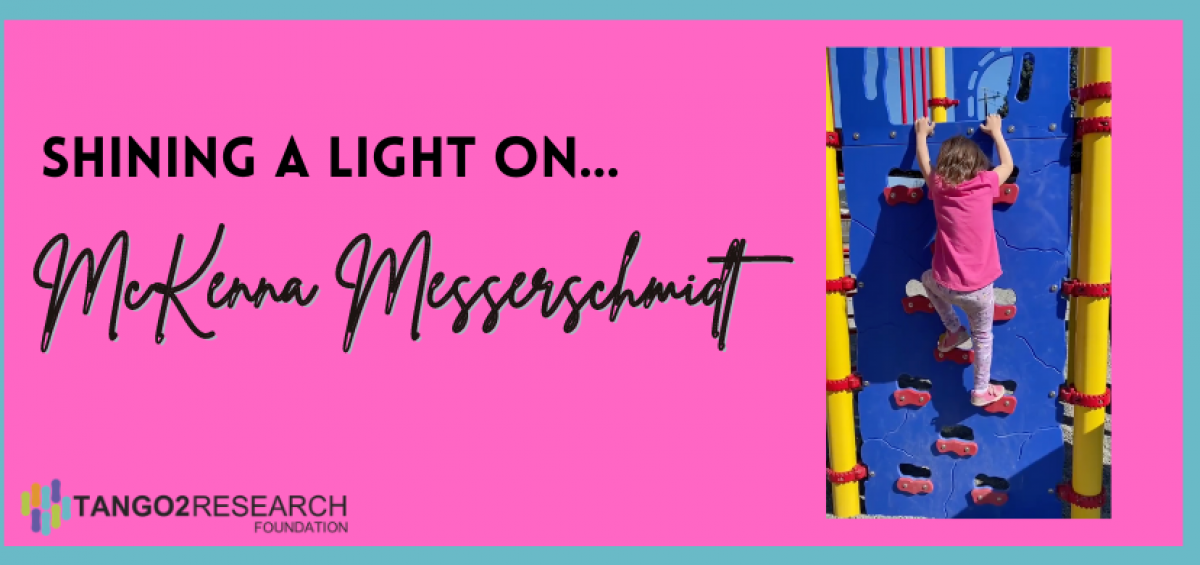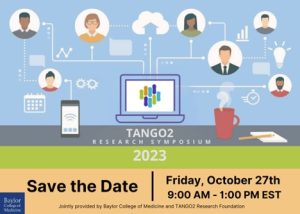If you were on our Shine a Light on TANGO2 kickoff event back in February, you met Lindsey and Brad Messerschmidt! Lindsey and Brad are parents to three children diagnosed with TANGO2 disease.
They live in Spokane, Washington. Their first son Jackson passed away at the age of three and at the time, he did not have a diagnosis yet. One year after his passing, they learned of his diagnosis of TANGO2 disease and found out that their other two children also had the disease. Daniel is six years old and in kindergarten this year and McKenna is four years old, going to preschool.
They proudly serve as our ambassador family for this year’s Shine a Light on TANGO2 campaign.
We chatted with ambassador mom, Lindsey, to ask about McKenna and her recent milestone of conquering a rock climbing wall. Read the interview below to hear all about her journey to get to where she is today!
When did you first notice physical developmental delays?
With McKenna, we were very aware of her development and we actually got the TANGO2 Diagnosis for her two brothers when she was six months old. We had her tested and had confirmation that she too had TANGO2 disease by the time she was nine months old. When she was about one, we noticed that she was not walking. She was crawling and sitting up but her balance was starting to get worse. The first gross motor milestone she missed was walking. At 15 months old, she had made some nice progress in physical therapy and was almost walking but unfortunately she had her first seizure at 15 months old as well. At this point, we began to see heartbreaking regression of previous milestones she had already met. She became more unbalanced as well. Like we had seen before with this puzzling disease, we took two steps forward and three steps back.
What did you do when you started noticing this?
Because we had her diagnosis so early, there was no question about “why” she was having these delays. We had been through this twice before. Early intervention is so important in children with developmental delays, and with a diagnosis like TANGO2 disease, it was no question to my husband or myself, we began physical, occupational and speech therapy almost immediately following the confirmation of her diagnosis. With our previous children, we had to do a lot of advocating with pediatricians to even get them to order therapies. With McKenna, it was a simple phone call to our favorite pediatrician that we have grown to love so much. All we had to tell her was that it was time. She didn’t ask any questions, she simply wrote the orders for physical, occupational, and speech therapies. Having the early diagnosis for McKenna helped us feel so much more sure about ourselves. We didn’t have to convince others or doctors that something was wrong. It was such a relief that we could easily access therapies and medical interventions for her without fighting for them every step of the way.
How did McKenna get to where she is today (and able to climb a rock climbing wall)?
So little is known about TANGO2 and my husband and I have learned over the past 10 years of dealing with this disease for our three children to be careful about drawing conclusions. The second we think we have something figured out with our kids, the disease will somehow prove us wrong. I will say that early diagnosis has been key in getting McKenna into therapies early and also in getting her medical intervention early as well. There is so much about this disease we can’t control so we try to focus on what we can control. She attends weekly therapies. We are lucky to have access to good healthcare and insurance that covers therapies so we take full advantage. Her physical, occupational, and speech therapists have been with us for years. They really listen to us and they are motivated to learn about TANGO2 disease. And I can’t forget to say, McKenna has worked hard for every milestone she has met. She is so determined and resilient and we are so proud of her accomplishments and hard work every day.
What advice do you have for other parents who may be going through similar physical developmental hurdles?
This disease is relentless and unfair. I will sometimes find myself wondering why McKenna is able to walk and my first son Jackson was never able to sit up. When I go down this thought path, I have to stop myself. Each TANGO2 child is affected differently. For my family, it has been helpful to focus on each child separate from their disease and let them lead the way with their abilities and interests and yet also work hard to push them and challenge them so that they can reach their full potential, whatever that looks like. For Jackson, physical therapy looked much different than it does for McKenna and that is okay! The progress each of them made is equally victorious! Something else I will say about TANGO2 parents is that they are the experts on their child. Keep advocating and keep fighting for their needs and don’t give up hope!











